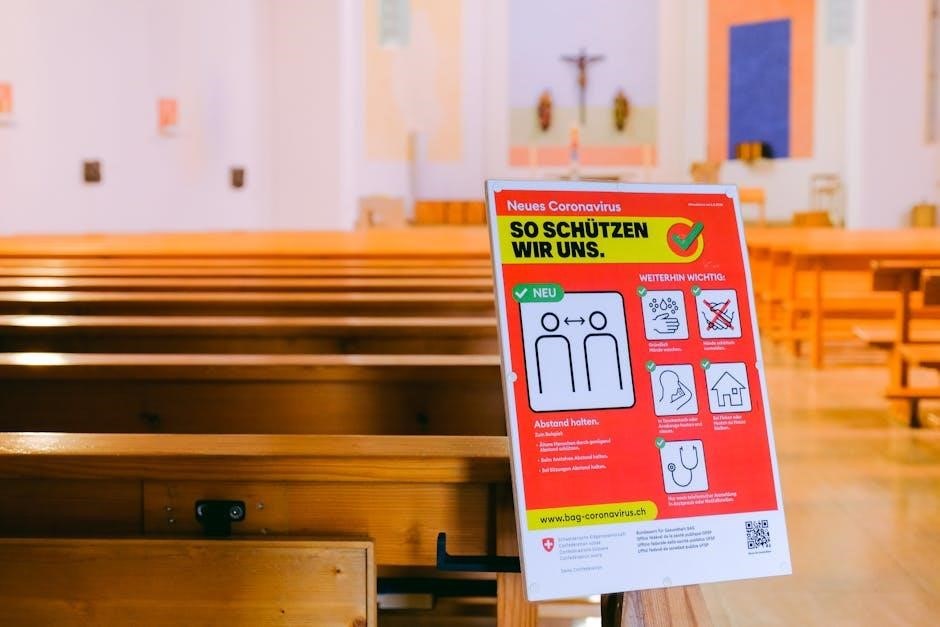St. Ignatius of Loyola, a 16th-century spiritual leader, crafted the 14 Rules of Discernment to guide individuals in distinguishing between divine inspiration and evil influence. These timeless principles offer practical wisdom for spiritual growth, decision-making, and overcoming challenges, helping believers align their lives with God’s will through prayerful reflection and self-awareness.
Overview of St. Ignatius of Loyola and His Spiritual Legacy
St. Ignatius of Loyola, a 16th-century Spanish saint, is renowned for founding the Jesuits and authoring the Spiritual Exercises. His teachings emphasize discernment, prayer, and decision-making aligned with God’s will. Ignatius’s spiritual legacy lies in his ability to guide individuals toward deeper faith and virtue through practical wisdom. His 14 Rules of Discernment, part of the Spiritual Exercises, provide a framework for distinguishing divine inspiration from evil influence. Ignatius’s insights remain pivotal in Catholic spirituality, offering tools for navigating life’s challenges and fostering a profound relationship with God. His work continues to inspire seekers of spiritual growth and discernment worldwide.
The Importance of Discernment in Spiritual Growth
Discernment is a cornerstone of spiritual growth, enabling individuals to distinguish between God’s guidance and worldly or evil influences. It fosters self-awareness, helping believers recognize their inner movements and align their choices with divine will. By cultivating discernment, one gains clarity in decision-making, deepens their faith, and nurtures virtues such as humility and patience. St. Ignatius’s 14 Rules provide a structured approach to discernment, equipping individuals to navigate life’s challenges and remain steadfast in their spiritual journey. This practice not only enhances personal holiness but also strengthens the ability to serve others and fulfill God’s plan, making discernment an essential tool for a meaningful and purpose-driven life.
Structure and Purpose of the 14 Rules
The 14 Rules of Discernment, crafted by St. Ignatius of Loyola, are structured as a sequential guide to help individuals navigate spiritual challenges. Each rule builds upon the previous, offering insights into recognizing divine inspiration and resisting evil influences. The rules begin by defining spiritual consolation and desolation, then explore the tactics of evil spirits, and finally provide practical advice for maintaining faith during trials. Their purpose is to empower believers to discern God’s will, fostering spiritual growth and clarity in decision-making. By understanding these principles, individuals can cultivate resilience, humility, and trust in divine providence, ultimately aligning their lives with God’s plan.

Historical Context of the Rules
The 14 Rules of Discernment were developed by St. Ignatius of Loyola in the 16th century as part of his Spiritual Exercises, providing a framework for distinguishing divine inspiration from evil influence.
Development of the Spiritual Exercises
The Spiritual Exercises, created by St. Ignatius of Loyola, were developed during his recovery from battle injuries. Through intense prayer and reflection, Ignatius discerned God’s will, shaping the Exercises into a structured 30-day retreat; These Exercises include meditations, prayers, and practical guidance to deepen one’s spiritual life. The 14 Rules of Discernment emerged as a key component, aiding individuals in recognizing the movements of their souls, distinguishing between good and evil spirits. This foundational work has become central to Ignatian spirituality, offering a pathway for seekers to align their lives with divine purpose and navigate spiritual challenges effectively, fostering enduring faith and resilience.
Origins of the Discernment Rules
The 14 Rules of Discernment originated from St. Ignatius of Loyola’s profound spiritual experiences during his recovery and subsequent retreat at Manresa. These rules were part of his broader Spiritual Exercises, designed to guide individuals in understanding the movements of their souls. Ignatius developed them as practical tools to distinguish between divine inspiration and the influence of evil spirits. Rooted in his own struggles with temptation and spiritual growth, the rules reflect his deep understanding of human nature and the spiritual life. They were later refined and included in his Spiritual Exercises, becoming a cornerstone of Ignatian spirituality and a timeless guide for those seeking to align their lives with God’s will.
Relevance in Modern Spirituality

St. Ignatius’s 14 Rules of Discernment remain highly relevant in modern spirituality, offering timeless wisdom for navigating life’s challenges. In today’s fast-paced, often chaotic world, these rules provide a framework for distinguishing between God’s guidance and harmful influences. They help individuals cultivate self-awareness, discernment, and resilience, essential for maintaining spiritual balance. The principles are widely applied in decision-making, overcoming spiritual dryness, and deepening one’s relationship with God. Resources like PDF guides and online workshops make these rules accessible to contemporary audiences, ensuring their enduring impact as a powerful tool for spiritual growth and discernment in everyday life.

Detailed Explanation of the 14 Rules
St. Ignatius’s 14 Rules of Discernment provide a structured guide to understanding spiritual movements, distinguishing between divine inspiration and evil influence, and navigating life’s challenges with clarity and faith.

Rule 1: Understanding Spiritual Consolation and Desolation
Rule 1 introduces the foundational concepts of spiritual consolation and desolation. Spiritual consolation is characterized by feelings of joy, hope, and love for God, often accompanied by tears of repentance or devotion. It strengthens faith, hope, and charity, drawing the soul closer to God. In contrast, spiritual desolation involves darkness, restlessness, and a sense of separation from God, often marked by laziness, sadness, or lack of motivation. Ignatius emphasizes recognizing these states to discern their sources. Consolation typically comes from God, while desolation may stem from evil spirits or personal failings. Understanding these dynamics is crucial for navigating spiritual growth and making decisions aligned with God’s will.
Rule 2: Contrasting Methods of Good and Evil Spirits
Rule 2 highlights the contrasting approaches of good and evil spirits in influencing individuals. The evil spirit typically provokes sadness, doubt, and obstacles, discouraging progress in spiritual growth. It uses false reasoning to unsettle and hinder those striving to serve God. Conversely, the good spirit brings encouragement, strength, and consolation, fostering courage and resolve to continue on the spiritual path. This rule helps individuals recognize these opposing influences, enabling them to discern divine guidance from demonic interference. By understanding these methods, one can better navigate spiritual challenges and remain steadfast in their commitment to God, aligning their actions with His will and purposes.
Rule 3: The Role of Spiritual Consolation
Rule 3 defines spiritual consolation as a profound interior movement where the soul is filled with love for God, leading to a deep connection with the Creator. This consolation often manifests as increased faith, hope, and charity, bringing joy and peace. It may also include tears of repentance or compassion for Christ’s sufferings. Ignatius emphasizes that true consolation inspires selfless love, detaching the heart from worldly attachments. This rule helps individuals identify genuine spiritual experiences, contrasting them with fleeting emotions. By recognizing consolation, one can nurture a deeper relationship with God, aligning their heart and actions with divine will and fostering lasting spiritual growth and devotion. This awareness is crucial for discerning God’s presence in daily life.

Rule 4: Recognizing Spiritual Desolation
Rule 4 describes spiritual desolation as the opposite of consolation, characterized by feelings of darkness, disturbance, and restlessness in the soul. It manifests as a lack of faith, hope, and love, leaving one feeling disconnected from God. Desolation often brings laziness, sadness, and a sense of separation from the divine. Ignatius explains that during such times, the evil spirit may intensify its attacks, fostering doubt and discouragement. Recognizing desolation is crucial for spiritual growth, as it calls for perseverance and trust in God’s providence. By understanding these periods, individuals can resist the enemy’s influence and remain faithful, even when spiritual comfort is absent, aligning their actions with God’s will despite inner turmoil. This awareness strengthens resilience and deepens spiritual maturity.
Rule 5: Maintaining Resolutions During Desolation
Rule 5 emphasizes the importance of steadfastness in spiritual resolutions during periods of desolation. St. Ignatius advises against making changes to one’s commitments or decisions when experiencing spiritual dryness, as such times are often influenced by the evil spirit. Instead, individuals should remain firm in the resolutions made during consolation, trusting that these choices align with God’s will. Desolation can cloud judgment, making it harder to discern correctly, so relying on prior, prayerfully made decisions is crucial. This rule underscores the value of consistency and faith, even when spiritual comfort is absent, ensuring that one’s actions remain guided by divine intentions rather than fleeting emotions or doubts. By holding firm, individuals cultivate resilience and trust in God’s providence, fostering deeper spiritual growth and stability. This practice helps distinguish between genuine spiritual guidance and the enemy’s deceptive influences, ensuring that one’s path remains aligned with God’s plan. Staying committed to resolutions during desolation strengthens the soul’s ability to navigate challenging times with faith and perseverance.
Rule 6: Intensifying Spiritual Practices in Desolation
Rule 6 advises intensifying spiritual practices during periods of desolation to counteract the enemy’s influence. St. Ignatius recommends increasing efforts in prayer, meditation, and penance to strengthen resolve and resist discouragement. By deepening spiritual disciplines, individuals can overcome the temptations and doubts that arise in desolation. This rule emphasizes proactive engagement with faith, even when spiritual consolation is absent. Through persistent prayer and self-reflection, one can seek clarity and renewal, trusting in God’s grace to navigate challenging times. This approach fosters resilience and spiritual maturity, helping individuals remain faithful despite emotional or spiritual dryness, ensuring their path aligns with divine will. Intensifying practices during desolation becomes an act of trust and surrender to God’s providence.
Rule 7: Trusting in Divine Providence During Trials
Rule 7 emphasizes trusting in divine providence during times of spiritual desolation or trials. It reminds us that even when we feel abandoned, God remains present, offering sufficient grace to resist evil and persevere. The rule encourages recognizing that the Lord allows trials to test our resolve and deepen our reliance on Him. While we may lack intense spiritual fervor, God’s grace is still at work, enabling us to navigate challenges. This rule invites us to embrace humility and patience, trusting that divine providence guides us even in darkness. By surrendering to God’s plan, we find strength to overcome trials and grow in spiritual maturity, trusting in His eternal love and care.
Rule 8: Cultivating Patience in Desolation
Rule 8 focuses on the importance of cultivating patience during periods of spiritual desolation. It advises against becoming frustrated or disheartened by the challenges and dryness that often accompany desolation. Instead, one should employ the methods outlined in Rule 6, such as intensifying prayer, meditation, and acts of penance, to counteract the desolation. The rule emphasizes that patience is a virtue that allows us to endure trials with grace, trusting that consolation will eventually return. By practicing patience, believers can resist the enemy’s attempts to discourage them and remain steadfast in their spiritual journey, fostering resilience and a deeper trust in God’s providence. This patience is essential for navigating the ebbs and flows of the spiritual life.
Rule 9: Causes of Spiritual Desolation
Rule 9 identifies three primary causes of spiritual desolation. First, it arises from tepidity, laziness, or negligence in spiritual practices, leading to a withdrawal of divine consolation. Second, desolation may occur as a trial, testing one’s commitment to God’s service without the comfort of spiritual highs. Third, it serves to humble the soul, preventing pride by reminding us that spiritual gifts are not our own but God’s grace. These causes help believers recognize that desolation is not a punishment but an opportunity for growth, fostering humility, self-awareness, and a deeper reliance on God’s providence rather than fleeting feelings of consolation.
Rule 10: Preparing for Future Desolation
Rule 10 emphasizes the importance of preparing for future desolation during times of consolation. It encourages individuals to reflect on how they will act when spiritual dryness or challenges arise. By doing so, one can strengthen their resolve and build resilience against future trials. This rule advises seeking grace and strength in moments of spiritual abundance to navigate desolation effectively. It underscores the value of foresight and spiritual readiness, ensuring that believers remain steadfast in their faith and commitments even when consolation fades. This proactive approach fosters spiritual maturity and helps individuals trust in God’s providence, even amidst uncertainty and difficulty.
Rule 11: Humility in Times of Consolation
Rule 11 teaches the importance of humility during times of spiritual consolation. It advises individuals to remain humble and acknowledge that all spiritual gifts come from God, not from personal merit. During consolation, one should reflect on how they would act in times of desolation, recognizing their dependence on divine grace. This rule encourages believers to avoid pride and instead cultivate gratitude for the blessings they receive. By embracing humility, individuals can maintain a balanced spiritual life and deepen their trust in God’s providence, even when facing challenges. This practice fosters a healthy and grounded approach to spiritual growth, emphasizing reliance on God rather than self.

Rule 12: The Enemy’s Weakness and Human Courage
Rule 12 highlights the enemy’s weakness in the face of human courage and strong will. It compares the enemy to a woman who grows weak when confronted with vigor and determination. When individuals stand firm against temptations, the enemy’s power wanes. Conversely, if one falters or loses resolve, the enemy’s attacks intensify. This rule underscores the importance of boldness and persistence in spiritual battles. By opposing evil with courage, believers can overcome its influence and remain steadfast in their commitment to God. This principle encourages Christians to embrace resilience and trust in divine strength, knowing that their courage diminishes the enemy’s hold on their lives.
Rule 13: The Enemy’s Secrecy and Deception
Rule 13 emphasizes the enemy’s preference for secrecy and deception in his dealings with souls; Like a licentious lover, the enemy seeks to keep his persuasions and intentions hidden, as exposure undermines his plans. When the enemy’s deceitful suggestions are revealed to a confessor or spiritual guide, he is disheartened, recognizing that his schemes will fail. This rule highlights the importance of transparency and openness in spiritual life, as secrecy allows evil to thrive. By bringing such thoughts into the light, individuals can discern God’s will and resist the enemy’s hidden tactics, fostering greater trust in divine guidance and protection.
Rule 14: The Enemy’s Strategic Attacks on Weaknesses
Rule 14 illustrates how the enemy strategically targets an individual’s weakest points to lead them astray. Like a military commander assessing a fortress, the enemy identifies and attacks the areas where a person is most vulnerable, whether in virtues, morals, or spiritual practices. This rule underscores the need for self-awareness and vigilance. By recognizing one’s weaknesses, individuals can strengthen them through prayer, reflection, and spiritual exercises. Ignatius encourages believers to fortify their defenses, relying on God’s grace to resist the enemy’s assaults. This rule serves as a call to proactive spiritual growth, ensuring that one’s vulnerabilities do not become avenues for spiritual defeat.

Practical Application of the Rules
The 14 Rules offer practical guidance for daily spiritual life, helping individuals identify divine inspiration and resist evil influences. By applying these principles, one can make discerning decisions, strengthen faith, and deepen their relationship with God through prayer and reflection.
How to Use the Rules in Daily Life
Applying St. Ignatius’ 14 Rules in daily life involves recognizing spiritual consolation and desolation, maintaining resolutions during challenging times, and intensifying prayer and reflection. Individuals can integrate these principles by practicing self-awareness, seeking guidance from spiritual directors, and reflecting on their experiences. The rules encourage patience, trust in divine providence, and humility, helping believers navigate life’s decisions with clarity and purpose. By incorporating these practices, one can discern God’s will, overcome spiritual dryness, and foster a deeper connection with their faith, leading to a more meaningful and spiritually grounded life.
Discerning God’s Will in Decision-Making
St. Ignatius’ Rules offer a framework for discerning God’s will in decision-making by helping individuals identify the source of their thoughts and emotions. By recognizing patterns of spiritual consolation and desolation, one can distinguish between divine inspiration and worldly or evil influences. The rules encourage patience, reflection, and trust in divine providence, especially during challenging times. When faced with choices, individuals are advised to seek clarity through prayer, meditation, and consultation with spiritual guides. By aligning decisions with virtues and a deeper connection to God, the rules empower believers to make choices that foster spiritual growth and alignment with God’s plan.
Overcoming Spiritual Dryness
St. Ignatius’ Rules provide guidance for navigating spiritual dryness, a common experience characterized by a lack of consolation and fervor. He emphasizes perseverance in prayer and spiritual practices, even when feelings of dryness persist. During such periods, Ignatius advises intensifying efforts through penance, meditation, and self-reflection, as these actions strengthen resolve and deepen faith. Trusting in God’s providence and recognizing that dryness is a natural part of spiritual growth helps individuals remain steadfast. By maintaining resolutions and seeking comfort in divine love, believers can emerge from spiritual dryness with greater humility and a stronger connection to God, ultimately finding peace and renewal in their journey.

Resources for Further Learning
Explore books like The Discernment of Spirits by Timothy M. Gallagher and Living the Discerning Life. Access online guides, workshops, and a free PDF guide for deeper understanding.
Recommended Books on Ignatian Discernment
For deeper understanding, explore books like The Discernment of Spirits: An Ignatian Guide for Everyday Living and Living the Discerning Life: The Spiritual Teaching of St. Ignatius of Loyola. These resources provide practical insights and real-life applications of the 14 Rules, helping readers discern God’s will and navigate spiritual challenges. The Discernment of Spirits by Timothy M. Gallagher is particularly acclaimed for its accessible interpretation of Ignatian principles. Additionally, Rules for the Discernment of Spirits offers a comprehensive guide to understanding the rules in simple language, making them applicable to modern life. These books are invaluable for those seeking to integrate Ignatian discernment into their spiritual journey.
Online Guides and Workshops
Enhance your understanding of St. Ignatius’ 14 Rules through online guides and workshops, offering accessible and interactive learning experiences. Websites like Jesuit.org and platforms dedicated to Ignatian spirituality provide detailed explanations, practical examples, and downloadable resources. Many guides include step-by-step explanations of each rule, along with real-life applications, making them ideal for personal reflection or group study. Additionally, some websites offer video tutorials, podcasts, and interactive exercises to deepen your grasp of discernment. These online tools are perfect for those seeking to integrate Ignatian wisdom into their daily lives, offering flexibility and convenience for spiritual growth.
Accessing the PDF Guide to the 14 Rules
A convenient way to explore St. Ignatius’ teachings is by accessing the 14 Rules of Discernment PDF guide. This downloadable resource provides a comprehensive overview of the rules, offering clear explanations and practical applications. Many websites, such as IgnatianSpirituality.com, offer free PDF downloads, making it easy to study the rules at your own pace. The guide is ideal for personal reflection, group discussions, or as a reference for spiritual retreats. By downloading this PDF, you can deepen your understanding of Ignatian discernment and apply its principles to your daily life, fostering greater spiritual clarity and decision-making.
St. Ignatius’ 14 Rules of Discernment remain a timeless guide for spiritual growth, offering clarity in distinguishing divine inspiration from evil influence. Embrace these principles for a deeper, purposeful faith journey.
Summarizing the Value of the 14 Rules

The 14 Rules of Discernment by St. Ignatius of Loyola provide a profound framework for navigating spiritual challenges and recognizing divine guidance. They distinguish between movements of the soul, helping individuals identify thoughts inspired by God and those influenced by evil spirits. By understanding spiritual consolation and desolation, one can maintain resolve during trials and grow in virtue. These rules emphasize patience, humility, and trust in divine providence, offering practical wisdom for daily life and decision-making. They empower believers to align their actions with God’s will, fostering a deeper, more purposeful spiritual journey.
Encouragement to Embrace Ignatian Discernment
Embracing Ignatian discernment invites you to deepen your spiritual life and align your decisions with God’s will. By applying the 14 Rules, you gain clarity in distinguishing divine guidance from worldly distractions. These principles empower you to navigate life’s challenges with confidence, fostering humility, patience, and trust in divine providence. Ignatian discernment is not just a historical concept but a timeless tool for modern spirituality, helping you grow in virtue and purpose. As you integrate these rules into your daily life, you will discover a profound sense of peace and direction, enabling you to live a life that reflects God’s plan for you.
